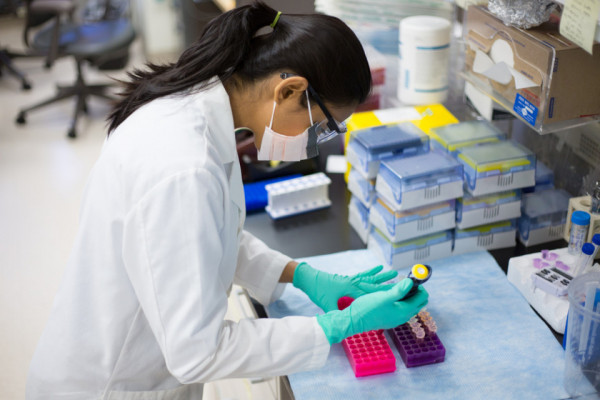
University of Bolton, Deane Road, Bolton. BL3 5AB
Tel:
Email:


“At the University of Bolton, we take great pride in providing a quality, supportive learning environment for our students.”
Professor George E Holmes DL | President & Vice Chancellor
“...tutors are very supportive and you’re not just a student ID number, at this university you are an individual with a name.”
Ellisse Vernon | BSc (Hons) Adult Nursing
Back to menu
Back to menu
Study with an Off-Campus Partner
Back to menu
Back to menu
University of Bolton, why we are the right choice
Location - Bolton, Greater Manchester

23/08/2023
Did you know that biomedical science degrees are responsible for an astonishing 90% of medical breakthroughs? Yes, you read that right! Biomedical science degrees hold the key to transforming healthcare as we know it.
Behind every ground-breaking discovery and every life-saving therapy, there is a team of dedicated biomedical scientists working hard to unravel the mysteries of the human body.
Imagine the power of decoding the human genome. Or understanding the intricate mechanisms of diseases. Or developing cutting-edge treatments that can save countless lives. This degree is at the forefront of medical innovation and propels us towards a healthier future.
In this blog, we will go on a captivating journey through the realm of biomedical science degrees. We will delve deep into the fascinating world of scientific exploration. So, fasten your seatbelts, we are going on a science trip!
Is Biomedical Science a Good Degree?
It's more than a good degree—it's an exceptional one. It offers a gateway to a world of exciting opportunities and a chance to make a real impact on society.
With this degree, you become part of a dynamic field that combines biology, medicine and technology. You'll have the chance to unravel the mysteries of life. You will contribute to important research that can change lives.
But what makes this degree stand out? It's the perfect blend of theory and practice. You'll gain a solid foundation in scientific principles while also developing practical skills through hands-on laboratory work and research projects.
Imagine working on cutting-edge experiments, analysing complex data and collaborating with top-notch scientists, providing the platform for you to shine in a field where innovation knows no bounds.
What Could I Do With a Degree?
Are you curious about the endless possibilities that await?
Picture yourself in a lab coat, exploring the intricacies of the human body. You will be unlocking the secrets of diseases and developing innovative treatments.
As a biomedical scientist, you could play a crucial role in drug discovery. You will be testing and evaluating the effectiveness of new medications. You will shape the future of pharmaceutical advancements.
But that's not all—your expertise could extend to the world of diagnostics. There you'll develop cutting-edge techniques to detect diseases and improve patient outcomes.
If you're passionate about personalised medicine, a degree in this field can pave the way for a career in genetic counselling. There you'll help individuals make informed decisions based on their genetic profiles.
Consider the awe-inspiring field of regenerative medicine with a biomedical degree, there you'll have the opportunity to contribute to the development of therapies.
Or your interests could lie in the realm of public health. You can make a difference in communities by studying and combating the spread of infectious diseases.
You could also venture into academia, share your knowledge, and inspire the next generation of scientists.
And let's not forget the entrepreneurial path. You could establish your own biotech start-up. You will be turning innovative ideas into tangible solutions that shape the future of healthcare.
The possibilities are vast and the opportunities abundant. Biomedical science degrees open doors to a world where you can make a tangible impact on people's lives and leave a legacy.

Are Biomedical Science Degrees in Demand?
In today's rapidly advancing world, the demand for skilled biomedical scientists is soaring to new heights. As healthcare becomes complex, the need for professionals who can bridge the gap between science and medicine has never been greater.
Pharmaceutical companies are seeking graduates to drive their drug discovery efforts. They need them to develop innovative therapies that can transform lives.
Research institutions want talented individuals who can unravel the mysteries of diseases. They need people who can conduct experiments and push the boundaries of scientific knowledge.
Hospitals and clinical laboratories rely on biomedical scientists to conduct diagnostic tests. They also analyse patient samples and provide crucial insights that guide treatment decisions.
The booming field of biotechnology is calling for experts. They want people who can harness the power of genetic engineering, gene therapy and precision medicine. They want them to tackle some of the most challenging health conditions of our time.
Public health agencies need skilled professionals who can tackle infectious diseases and also conduct epidemiological studies and contribute to disease prevention strategies.
The demand is not limited to traditional healthcare settings. Biomedical graduates are valuable in academics, research institutions and even the legal sector.
What Roles Could I Get?
Biomedical Engineer:
As a biomedical engineer, you'll blend your engineering principles with medical expertise. You design and develop groundbreaking medical devices and equipment. From artificial organs to advanced imaging systems, your work will revolutionise healthcare. With entry-level salaries starting at £27k, this role offers great financial rewards. It also gives the satisfaction of improving patient care through technological innovation
Clinical Scientist (Biochemistry):
Taking on this role will require you to interpret and validate the results of samples from patients' blood, urine or other bodily fluids. This is important in terms of diagnosis, management and finding treatments for diseases. You can expect a starting salary of £32k as a graduate and have the potential to earn up to over £100k. Although the work requires a lot of skills, you can ensure you will be rewarded back for your hard work.
Biotechnologist:
With this position, your responsibilities will be researching the chemical, genetic, and physical characteristics of cells, tissues, and organisms. Your objective will be to innovate and create new technologies, methods, and products aimed at tackling major societal challenges. As a graduate starting out in this role, you can expect to be earning anything between £19k and £24k. Depending on your area of focus, salaries vary.

Could I Become a Doctor?
Are you dreaming of a career in medicine? Wondering if you can become a doctor?
Biomedical science degrees don't qualify you as a doctor. But they can be a powerful stepping stone towards that goal. With a strong foundation in biomedicine, you'll gain a deep understanding of the human body. You will learn about our diseases and medical research principles.
Many aspiring doctors pursue this degree as a pre-medical track. They complement it with prerequisite courses like biology, chemistry, physics and mathematics. Engaging in healthcare-related extracurricular activities can further strengthen your medical school application.
Upon completing your undergraduate biomedical degree, you'll need to apply to medical schools. After acceptance, you'll begin a rigorous medical programme. Then you will begin a placement program in your chosen speciality.
With dedication and a passion for healthcare, your biomedical science degrees can help you in your dream of becoming a doctor. Get ready to make a difference in the lives of others as you embrace this captivating journey.
What Qualifications Do I Need?
Biology is the backbone of biomedicine, so it's no surprise that it's a crucial A-level for aspiring biomedical degree students. You’ll learn the intricate workings of living organisms and understand the fundamentals of genetics, cell biology and physiology.
Chemistry is another essential A-level subject. Explore the world of atoms, molecules and chemical reactions. This lays the groundwork for understanding drug interactions, molecular biology and biochemistry.
Mathematics also plays a vital role in biomedicine. It helps you develop analytical and problem-solving skills. A solid foundation in mathematics will assist you in handling data analysis. It will also help in statistical modelling and computational biology.
While not always mandatory, physics can be a valuable A-level subject. It provides info about the physical principles of medical imaging techniques, such as X-rays and MRI scans.
Besides these core subjects, it's good to have strong written and verbal communication skills. Consider taking English or a similar subject to develop your ability to articulate complex ideas. Remember, specific entry requirements can vary among universities. So, it's essential to research the requirements of the institutions you're interested in.
Conclusion:
A biomedical degree from Bolton University is an exceptional degree. It opens doors to a world of exciting opportunities.
It offers a wealth of career paths in pharmaceuticals, research institutions, hospitals and more. Not only is it a rewarding field intellectually, but it also offers lucrative prospects. So, if you're captivated by the power of science, eager to push boundaries and passionate about improving lives, consider pursuing a biomedical science degree at Bolton University.
To learn more about Bolton University's courses, contact us at enquiries@bolton.ac.uk or call +44 1204 903142 to speak to a member of the team. Start your journey towards a rewarding career right away and experience #UniAsItShouldBe!